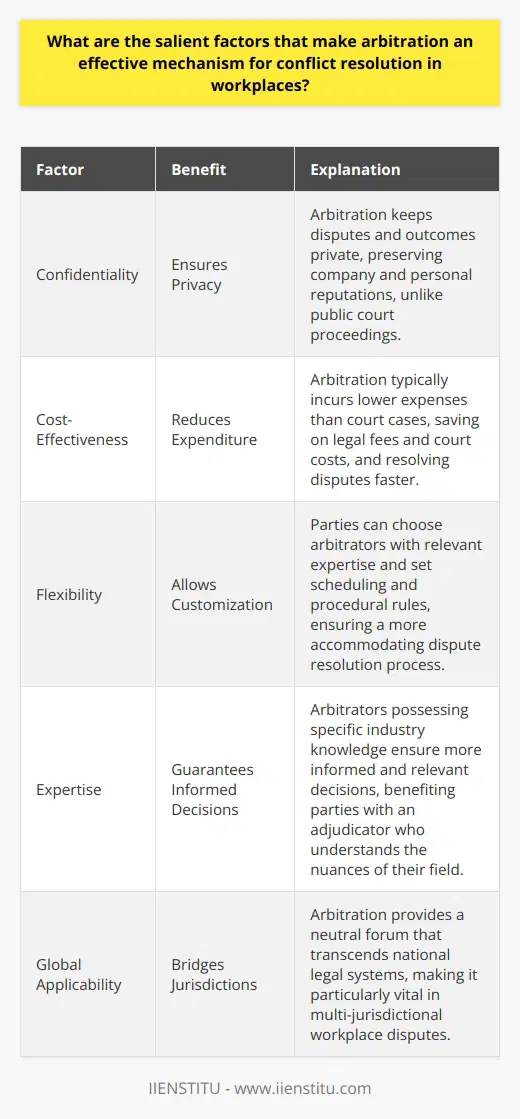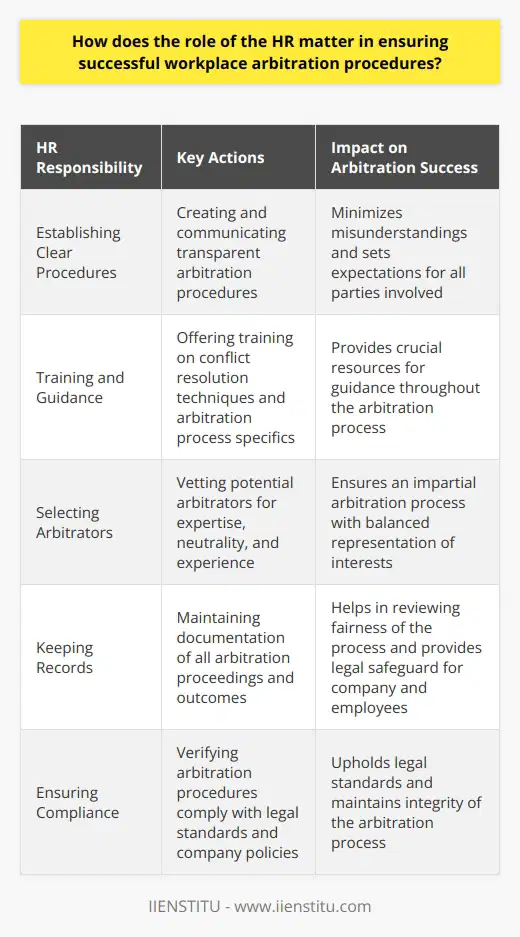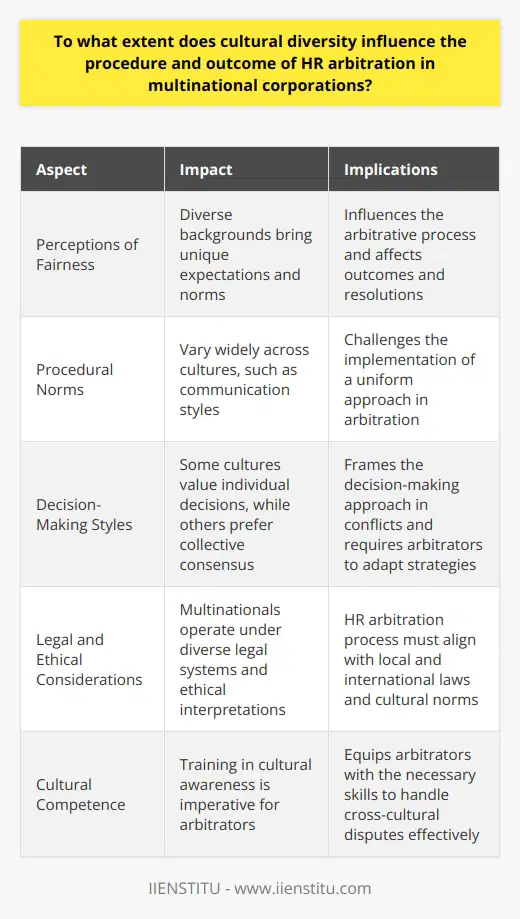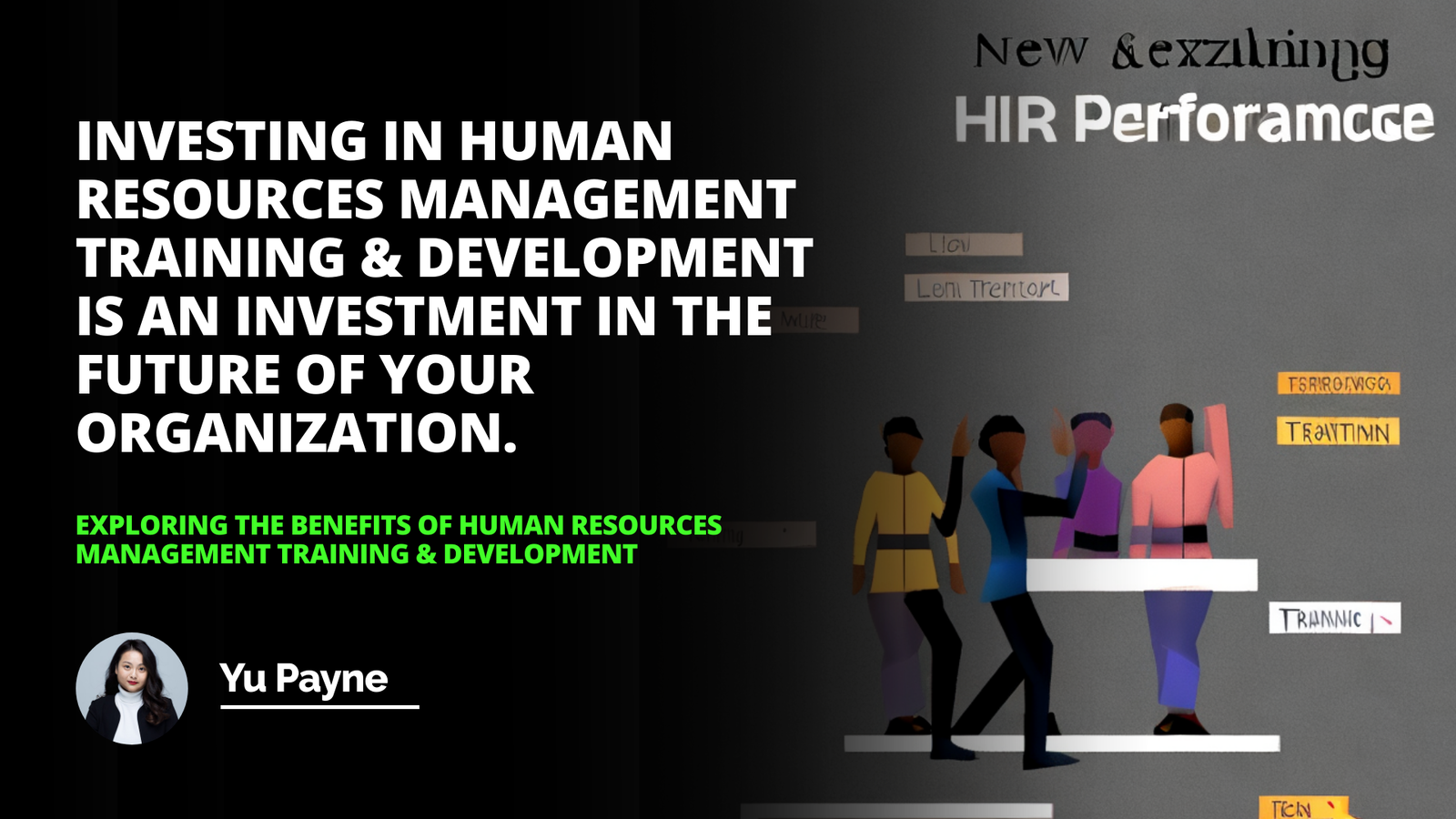
I remember a time early in my career when a colleague and I found ourselves at odds over a project deadline. It was a classic case of miscommunication, and tensions were high. We were both passionate about our work, but our differing perspectives led to a conflict that affected not just us but the whole team. That's when our HR department stepped in with a process I'd heard about but never fully understood: HR Arbitration.
Navigating the Complexities of HR Arbitration
The workplace, in all its dynamic glory, is indeed an intricate tapestry of relationships and responsibilities. Each thread represents a unique individual, and together they create the fabric of an organization. However, when threads get tangled, disputes arise, and that's where HR Arbitration comes into play.
What Exactly is HR Arbitration?
HR Arbitration is a structured process where an independent third-party, known as an arbitrator, steps in to resolve a dispute between employees, or between an employee and the employer. Unlike the courtroom drama we see on TV, this is a private and often less formal setting. The arbitrator listens to both sides and makes a binding decision that the parties agree to abide by.
Think of it as having a wise elder in the room, someone who can see the bigger picture and help untangle the knots in that tapestry. It's a form of Alternative Dispute Resolution (ADR) that emphasizes efficiency, confidentiality, and fairness.
A Brief Journey Through the History of HR Arbitration
The concept of arbitration isn't new. In fact, its roots can be traced back to ancient civilizations where community elders would settle disputes. However, HR Arbitration as we know it today has evolved significantly.
In the late 19th and early 20th centuries, as industries grew and labor movements gained momentum, arbitration became a vital tool in resolving labor disputes. According to "The Evolution of Industrial Relations" by John T. Dunlop, arbitration helped bridge the gap between employers and burgeoning unions, especially during the Industrial Revolution (Dunlop, 1958).
Over time, organizations recognized the value of arbitration not just in collective bargaining but also in individual employment disputes. This shift was pivotal in shaping modern HR practices.
Human Resources Job Description: Your Comprehensive Guide to HR Roles
Corporate HR Aligns Div/Unit HR: Guiding to Implement Plans Effectively
Flexible Benefits: A Comprehensive Guide to a Modern Workplace Paradigm
The Crucial Role of HR Professionals
HR professionals are often the unsung heroes in the arbitration process. They're the ones who:
1- Facilitate the Selection of an Arbitrator: Ensuring that the arbitrator is impartial and has the necessary expertise.
2- Prepare Documentation and Evidence: Gathering all relevant information to present a clear picture of the dispute.
3- Ensure Compliance with Policies and Laws: Making sure that the process adheres to both company policies and legal requirements.
4- Support the Parties Involved: Providing guidance and maintaining open lines of communication.
Their role is akin to that of a conductor in an orchestra, ensuring all the elements work in harmony to reach a resolution.
The Many Benefits of Embracing HR Arbitration
When I reflect on my personal experience, the arbitration process was a relief. It offered a way out of a stressful situation without damaging professional relationships.
Swift Resolution of Disputes
One of the standout advantages is the speed at which disputes can be resolved. Unlike court cases that can drag on for months or even years, arbitration is designed to be swift. This is crucial in maintaining productivity and morale within the team.
Maintaining Confidentiality
In a world where information spreads rapidly, confidentiality is paramount. Arbitration proceedings are private, ensuring that sensitive information doesn't become water cooler gossip. This protects the reputation of both the individuals involved and the organization as a whole.
Cost-Effective Compared to Litigation
Litigation can be expensive—with legal fees, court costs, and the intangible cost of time. Arbitration reduces these expenses significantly. The streamlined process eliminates many of the formalities of court, translating to savings for all parties involved.
Preserving Professional Relationships
Perhaps the most underrated benefit is the ability of arbitration to preserve, and sometimes even strengthen, professional relationships. By focusing on resolution rather than blame, parties can emerge from the process with a better understanding and renewed respect for each other.
The HR Arbitration Process Unveiled
Understanding the nuts and bolts of the arbitration process demystifies it and highlights its practicality.
Step-by-Step Through Arbitration
1- Initiation of Arbitration: One party requests arbitration, and both agree to proceed.
2- Selection of an Arbitrator: Both parties select an impartial arbitrator, sometimes from a list provided by an arbitration organization.
3- Preliminary Meeting: Ground rules are established, and the issues to be resolved are outlined.
4- Presentation of Cases: Each party presents their case, including evidence and witness testimonies.
5- Deliberation: The arbitrator reviews the information and deliberates.
6- Award Issued: A decision is made and is typically binding.
7- Implementation: The parties comply with the arbitrator's decision.
The Impartial Arbitrator
The arbitrator is the linchpin of the process. Their impartiality and expertise are crucial. Arbitrators often come from legal backgrounds or have specific industry knowledge. They must:
Remain Neutral: No bias towards either party.
Ensure Fairness: Provide equal opportunity for both sides to present their case.
Apply Relevant Laws and Policies: Base their decision on legal frameworks and company policies.
Bringing Closure to Disputes
Once the arbitrator issues the award, it's usually final. This finality provides closure, allowing everyone to move forward without lingering animosity. In rare cases, if there was a significant procedural error or evidence of bias, the award can be challenged, but courts generally uphold arbitration decisions.
The Intersection of HR and Legal Expertise
In today's complex work environment, HR professionals must wear many hats, and one of them is that of a quasi-legal advisor.
The Necessity of Legal Acumen in HR Arbitration
Understanding legal principles isn't just the domain of lawyers. HR professionals need to be conversant with laws related to employment, discrimination, and labor to navigate arbitration effectively.
For instance, the Equal Employment Opportunity Act and the National Labor Relations Act are critical pieces of legislation that HR must consider during disputes (Smith & Roberts, 2002). Missteps can lead to unenforceable arbitration agreements or, worse, legal action against the company.
HR's Role in Legal Strategy
While they may not argue cases in court, HR professionals contribute to legal strategies by:
Drafting Clear Policies: Ensuring company policies are compliant with laws and clearly communicated.
Educating Employees: Providing training on policies and legal obligations.
Documenting Everything: Keeping detailed records that can be vital in arbitration proceedings.
Overcoming Legal Challenges
Challenges arise, such as:
Enforceability of Arbitration Agreements: Courts may scrutinize these agreements for fairness.
Maintaining Confidentiality: Balancing transparency with privacy laws.
Bias Concerns: Ensuring the arbitrator selection process is fair.
Navigating these requires a delicate balance of legal knowledge and HR expertise.
Emerging Trends Shaping HR Arbitration
The world is changing rapidly, and so is HR Arbitration. Staying abreast of these trends is essential for modern HR professionals.
Technological Innovations Impacting Arbitration
The advent of technology has introduced tools like:
Virtual Hearings: Utilizing video conferencing to conduct arbitration remotely.
Online Dispute Resolution Platforms: Streamlining the process through specialized software.
Digital Evidence Presentation: Using electronic documents and multimedia presentations.
These advancements increase accessibility but also bring challenges like ensuring cybersecurity and managing digital etiquette.
The Remote Work Revolution
With more people working from home, disputes now often involve remote working conditions. Issues may include:
Work-Life Balance Boundaries: Expectations around availability outside traditional hours.
Equipment and Safety: Who is responsible for providing and maintaining equipment?
Communication Breakdowns: Misunderstandings due to lack of face-to-face interaction.
HR Arbitration must adapt to address these new dimensions of workplace disputes.
The Future Landscape of HR Arbitration
Looking ahead, we can anticipate:
Artificial Intelligence Integration: AI could assist in preliminary dispute assessments.
Globalization of Workforces: Cross-border disputes requiring understanding of international laws.
Increased Emphasis on Mental Health: Disputes involving stress, burnout, and accommodations.
Embracing these changes will be crucial in maintaining effective dispute resolution mechanisms.
The Vital Importance of HR Arbitration in Today's Workplace
Reflecting on my own journey, the arbitration process didn't just resolve the conflict; it taught me valuable lessons about communication, empathy, and professionalism.
Fostering a Positive Work Environment
HR Arbitration isn't just about resolving disputes—it's about preserving the integrity of the workplace. By addressing conflicts promptly and fairly, organizations can maintain a positive culture where employees feel heard and valued.
Encouraging Open Dialogue
Knowing that there is a fair process in place encourages employees to voice their concerns without fear of unfair retaliation. This openness can prevent small issues from escalating into major conflicts.
Supporting Organizational Goals
Efficient conflict resolution supports overall organizational goals by:
Reducing Turnover: Employees are more likely to stay when they feel their concerns are addressed.
Improving Productivity: Less time spent on conflicts means more focus on work.
Enhancing Reputation: A company known for fair practices attracts top talent.
Investing in HR Expertise
Organizations would do well to invest in their HR teams, providing training through human resource management courses or certificate courses offline. By equipping HR professionals with the latest knowledge and skills, companies can ensure they're prepared for any dispute that comes their way.
Bringing It All Together
In the end, conflicts are a natural part of any relationship, including those in the workplace. What matters is how we handle them. HR Arbitration offers a path forward, one that respects all parties involved and seeks a fair resolution.
By embracing this process, organizations not only resolve disputes but also strengthen their internal communities. As the workplace continues to evolve, so too will the mechanisms we use to keep our professional relationships strong and our environments healthy.
References:
Dunlop, J. T. (1958). Industrial Relations Systems. Henry Holt and Company.
Smith, R., & Roberts, L. (2002). Employment Law for Human Resource Practice. Thompson Learning.
Fisher, R., & Ury, W. (1981). Getting to Yes: Negotiating Agreement Without Giving In. Penguin Books.
Note: This content is inspired by real-world practices and is intended for educational purposes.
Frequently Asked Questions
What are the salient factors that make arbitration an effective mechanism for conflict resolution in workplaces?
Arbitration as a Preferred Conflict Resolution Tool
Arbitration stands out as a conflict resolution mechanism in workplaces for its efficacy and flexibility. Employers and employees alike consider it a preferred method over traditional litigation. Several factors contribute to its effectiveness.
Confidentiality Ensures Privacy
One key advantage of arbitration is confidentiality. Court proceedings often are public, exposing sensitive company information. Arbitration keeps disputes and outcomes private. This preserves company and personal reputations.
Cost-Effectiveness Reduces Expenditure
Cost is a crucial consideration. Arbitration typically incurs lower expenses than court cases. Parties save on legal fees and court costs. Time equates to money, and arbitration often resolves disputes faster. This efficiency reduces the financial impact on all involved.
Flexibility Allows Customization
The flexibility of arbitration allows customization to the needs of the parties. They can choose arbitrators with relevant expertise. This leads to more informed decision-making. They set scheduling and procedural rules. Flexibility ensures a more accommodating dispute resolution process.
Expertise Guarantees Informed Decisions
Arbitrators usually possess specific industry knowledge. Their expertise ensures more informed and relevant decisions. Parties benefit from an adjudicator who understands the nuances of their field.
Finality Provides Closure
The finality of arbitration decisions prevents protracted disputes. Unlike court decisions, there are limited grounds for appeal in arbitration. Parties can move forward without the threat of ongoing litigation.
Imposed Authority Creates Respect
Arbitration decisions have legal force. This imposed authority ensures compliance with outcomes. Parties respect and adhere to the decision, knowing it carries weight.
Autonomy Promotes Fairness
Parties in arbitration retain more control over the process. They choose their arbitrator and influence procedures. This autonomy creates a sense of fairness and investment in the outcome.
Consensual Nature Encourages Cooperation
Arbitration is often consensual, which encourages cooperation. Parties agree to the process, fostering a collaborative environment. This consensual nature can preserve professional relationships post-dispute.
Global Applicability Bridges Jurisdictions
For international disputes, arbitration offers global applicability. It provides a neutral forum that transcends national legal systems. This is particularly vital in multi-jurisdictional workplace disputes.
These factors make arbitration an effective mechanism for conflict resolution. It provides a tailored, efficient, and authoritative approach. Workplaces can resolve disputes while maintaining relationships and confidentiality. Arbitration remains an attractive alternative to litigation in complex employment landscapes.

How does the role of the HR matter in ensuring successful workplace arbitration procedures?
The Importance of HR in Workplace Arbitration
HR professionals hold a pivotal role in managing workplace disputes. They design and implement arbitration processes. These processes must align with both legality and fairness. HR ensures unbiased and proficient arbitrators preside over conflicts.
Establishing Clear Procedures
HR creates and communicates clear arbitration procedures. They make sure everyone knows these procedures. This transparency is key to a trustworthy process. It minimizes misunderstandings and sets expectations for all parties involved.
Training and Guidance
HR offers training for those involved in arbitration. This training includes managers and employees alike. It covers conflict resolution techniques and the specifics of the arbitration process. HR thus becomes a crucial resource for guidance throughout.
Selecting Arbitrators
Choosing the right arbitrator is critical. HR vets potential arbitrators for expertise, neutrality, and experience. They strive for a balanced representation of interests. This ensures that the arbitration process is impartial.
Keeping Records
Documentation is a key HR responsibility. HR maintains records of all arbitration proceedings and outcomes. These records help in reviewing the fairness of the process. They also provide a legal safeguard for the company and the employees.
Providing Support
HR supports all parties involved. This support is both emotional and procedural. HR professionals offer a listening ear and provide clarity on the arbitration steps. They become a pillar for employees to lean on.
Ensuring Compliance
HR verifies that arbitration procedures comply with the law. They stay updated with legal standards. They make sure that the company's policies uphold these standards.
Managing Post-Arbitration
After arbitration, HR manages the outcomes. They facilitate any necessary changes. They ensure that all terms of the arbitration award are implemented. They work to restore workplace relationships and normalcy.
Continuous Improvement
HR continually assesses the effectiveness of arbitration procedures. They seek feedback. They learn from each case. They adapt processes to serve better the organizational climate.
In summary, HR's role is multifaceted and essential. They set the foundation for a fair arbitration process. They lead by ensuring clarity, compliance, and support for all. The success of workplace arbitration heavily relies on their competence and dedication.

To what extent does cultural diversity influence the procedure and outcome of HR arbitration in multinational corporations?
Cultural Diversity in HR Arbitration
Understanding the Impact
Cultural diversity shapes HR arbitration significantly. It colors the perceptions of fairness. Diverse backgrounds bring unique expectations and norms. These differences often influence the arbitrative process. They also affect the outcomes and resolutions. Multinational corporations face this complexity routinely.
Procedure Variation
Procedural norms vary widely across cultures. A uniform approach is challenging. For instance, communication styles differ greatly. Some cultures favor directness. Others prefer indirect communication. This dichotomy can alter the arbitration procedure. Understanding cultural nuances is vital. It aids the creation of comfortable environments.
Decision-Making Processes
Decision-making styles also carry cultural weight. Some cultures value individual decisions. Others lean toward collective consensus. These preferences influence HR arbitration. They frame the decision-making approach in conflicts. Consequently, arbitrators must adapt their strategies. This ensures cultural sensitivities are in mind.
Outcome Fairness
Perceptions of fairness are deeply cultural. A fair outcome for one may seem unjust to another. Each culture interprets equity differently. The definition of a just process is not universal. Multinational corporations work toward universally accepted principles. However, practical application remains challenging.
Legal and Ethical Considerations
Multinationals operate under diverse legal systems. They must navigate through varying legal frameworks. Ethics too are interpreted through cultural lenses. The HR arbitration process must align with these aspects. Compliance with local and international laws is critical.
Building Cultural Competence
To address diversity, multinationals strive for cultural competence. Training in cultural awareness is imperative. Arbitrators need such training. It equips them with the necessary skills. Skills to handle cross-cultural disputes effectively.
Conclusion
The extent of cultural diversity's influence is profound. Multinational corporations recognize this impact. They seek to tailor HR arbitration procedures. Their goal is to accommodate this diversity. Results should be perceived as fair and legitimate. Cultural diversity challenges existing paradigms. Yet, it also offers opportunities for innovative approaches. Arbitration procedures continue to evolve. They reflect the rich tapestry of global workforces.



